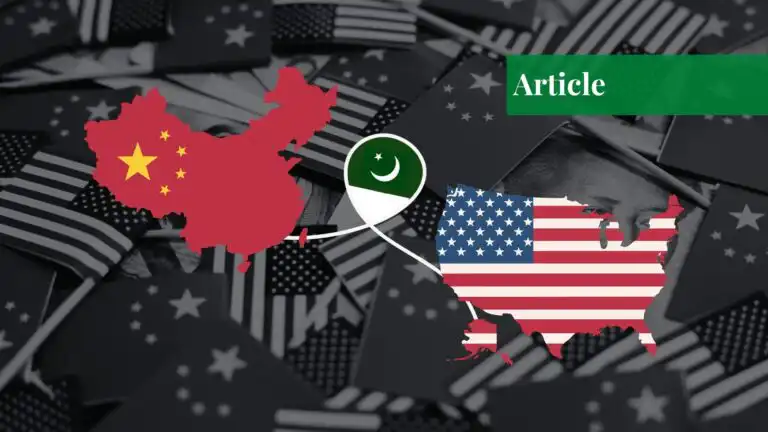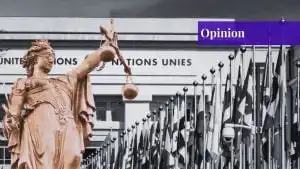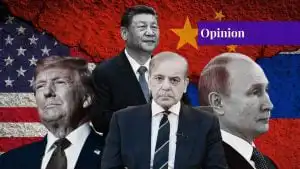Amidst the looming threats of a global economic recession, the world is witnessing turbulence in the geo-economic world order. The heart of this trade war is the trade deficit between the US and China, which Trump declared a national emergency. As the Trump administration imposed a non-negotiable 25% tariff on Chinese goods, the situation escalated to 145% tariffs with Beijing’s reciprocal response. China, relying on a tit-for-tat tariff strategy, imposed a whopping 125% tariff on all American goods, causing a $4 trillion loss to the American economy within the last 20 days, creating havoc in global stock markets.
This zero-sum strategy exposed economic faultlines through the stock market crash, forcing the world to reevaluate its financial strategies and investments. Pakistan is walking on a tightrope amidst the rising recessionary fears. Engagement on CPEC with China and a historical strategic alliance with America have complicated the situation for Pakistan. While navigating through this crossfire, Islamabad must ensure diplomatic neutrality with both sides while avoiding direct entanglement in the economic conflict.
The Strategic Stakes: Pakistan’s Relationship with the US and China
The pivotal point of China-Pakistan relations lies at the CPEC – a $65 billion investment. CPEC is a part of China’s BRI (Belt and Road Initiative) aimed at reducing China’s dependence on the Strait of Malacca. Thus, CPEC serves as a centerpiece of China-Pakistan bilateral relations involving green energy, infrastructure, transport, connectivity, and SEZs (Special Economic Zones). Chinese telecom firms like Huawei and ZTE have deep investments in Pakistan’s tech surveillance.
Moreover, many CPEC loans are backed by state guarantees. So, any disruptions can have legal implications under BITs (Bilateral Investment Treaties). Thus, these binding agreements limit Pakistan’s shift towards the US. In addition, China is Pakistan’s main defense supplier and veto-wielding ally in the UN against Indian aggression. All of these economic and military ties with China practically bind Pakistan to shift towards China’s foes in the geopolitical and geo-economic era.
On the opposite side to China is the US, Pakistan’s historical ally during the Cold War and post-9/11 era. Undoubtedly, Pakistan-US relations were sustained on traditional military and diplomatic support from the latter. Despite not being a front-line ally of the US at the moment, maintenance of peaceful terms with the US is crucial for favorable trade relations. Coming forward as Chinese supporters, Pakistan can jeopardize its access to the American market and will be directly hit by secondary sanctions like CAATSA. The US is continuously pressuring its allies to ban Huawei after its attempted infiltration of the US bases, which would lead to a clear breach of contract with China. Despite the mounting pressure, Pakistan has been avoiding signing the US-led tech coalitions like the Clean Network initiative.
Bilateral Investment Treaties (BITs) and Investor-State Dispute Settlements (ISDS)
Pakistan is a signatory to the BITs with both the US and China. It offers foreign investors protection against usurpation, discrimination, and unfair treatment. However, these BITs also include ISDS clauses allowing companies to sue Pakistan at international arbitration forums if their investments are harmed by state actions. Actions bypassing the ISDS have the jurisdiction to bypass domestic forums and to be heard in ICSID or UNCITRAL tribunals. A precedent in this regard lies in the case Tethyan Copper Co. v. Pakistan in ICSID, where Pakistan had to pay $6 billion in compensation for violation of the ISDS clause. So, banning Chinese products under US pressure or vice versa would lead Pakistan to a lawsuit by the other, creating legal implications.
Any potential ban on the Chinese telecom firms would open a Pandora’s box of legal claims from Beijing. Suing Pakistan in various domains by invoking the BITs to claim damages for discriminatory treatment would lead to economic faltering. Similarly, banning US-linked investments would lead the US to sue Pakistan under the Pak-US BITs. These suing records would have a huge blow on Pakistan’s FDI portfolio, further crumbling the investor confidence and already crippling economy. Thus, any supporting move on either side will result in the legal Catch-22 (obeying one legal obligation risks the violation of another). Therefore, being stuck between two rival interests is creating a complex conflict of laws. The solution lies in maintaining a strict strategic autonomy.
Impact of the US-China Trade War on Pakistan’s Data Protection Laws
This ongoing tariff trade war during Trump’s presidency isn’t the first. The 2018 chicken tariff war precedent is present, which ended up harming nations. However, this time the trade war is not just about tariffs anymore – it is a technological war, especially over the digital infrastructure. The Trump administration is urging its allies to boycott Huawei and ZTE over national security concerns. It is creating a tough situation for Pakistan, as China is deeply integrated in CPEC’s telecom system and policy. Therefore, Pakistan’s unstrategic dependence on China, along with the absence of a clear cyber diplomacy, will lead to isolation from American companies like Google.
Contrary to some scattered data protection laws, Pakistan to date lacks a comprehensive data protection law. This void of robust digital governance is making Pakistan vulnerable and dependent upon China for telecommunications and surveillance. This dependence might invite US sanctions or restrictions. While not supporting China could potentially invite BIT or ISDS claims. Therefore, there is a dire need to address the data protection law gap to attain self-sufficiency in the telecom domain, along with the avoidance of undue pressure from both sides.
Conclusion
Pakistan’s approach to diplomatic neutrality in the US and China trade war is not just a diplomatic act but a legal balancing act. Stuck and dependent upon the two economic giants, Pakistan must take steps carefully to navigate the situation. Economic, strategic, and military dependence upon both, along with the signed BITs and ISDS, along with voids in data protection law, places Pakistan on thin ice. Each strategic fallout has serious legal implications, whether through BIT clauses, arbitration damages, strategic isolation, or sanctions. The approach of neutrality for Pakistan in the current geo-economic order is nothing short of a high-stakes maneuver in international law and diplomacy.
If you want to submit your articles and/or research papers, please visit the Submissions page.
To stay updated with the latest jobs, CSS news, internships, scholarships, and current affairs articles, join our Community Forum!
The views and opinions expressed in this article/paper are the author’s own and do not necessarily reflect the editorial position of Paradigm Shift.
Areeba Imran is a third-year law student at Pakistan College of Law with a focused interest in constitutional law, environmental law, and the emerging field of space law. She serves as the general secretary of the Environment and Law Society and has interned at the Advocate General’s Office. Through her writing, Areeba aims to contribute to nuanced legal discourse on both national and global platforms.






